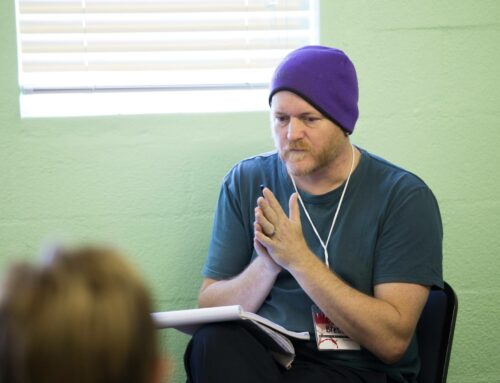this part added by my wife, TBV: Step away from the emotion of the moment. I really struggle to think clearly, reason well, and see things from Brett’s point of view, when I am caught up in the emotion of the immediate argument. I may be hurting, angry, frustrated, sad, feeling sorry for myself, or incredibly teary. I often cannot think straight at all and this results in me “blanking out” – literally shutting out everything that is going on and withdrawing to some place inside my head (or a spot on the roof). Because I cannot think clearly and my mind goes blank, I pull away from Brett and this can be interpreted as rejection.
If i’m “not there” he can’t rest secure in the fact that I love him at this time no matter what is going on. This is not a good time for me to try and move through that to “look at the facts”. In fact, sticking hard to the argument in spite of my emotional reaction to it at this point, usually results in things quickly escalating and more hurtful and untrue things being said to ward off what may feel like attack or to try and gain some control of the situation. So don’t. When I know that I am reacting out of emotion rather than responding to the issue, I try remember to ask Brett for a few minutes time-out.
Sometimes all I need is five minutes of quiet and sometimes it’s a lot longer (an hour?) – but I need this time to work through the emotional response to the issue, and actually figure out what I’m really feeling and what is going on…and most times in doing this I realise that the real “problem” is not what is presenting (the symptoms – i.e. the immediate issue, what he said, what I thought that meant, what I did) but actually something else. If your partner is someone who has a strong emotional response to the immediacy of the conflict, don’t try and push her (or him) to get beyond that while still in the moment. Give them time. Just remember to pull towards each other even during time-out.
Pick a good TIME to argue! Ha ha. Easier said than done, cos this stuff does not conform to our neat schedules of when it is convenient to argue. In fact, often B and I face stuff just as we are walking out the door to go to some youth thing or church or whatever. This is probably not a good time to attempt to resolve the thing, because at most we have 15 minutes to do it in. Which means that the argument is going to escalate and more things will be said and maybe if we lucky we will get to the heart of what is going on, but we won’t have time to work through it and get back to a good place. So we will both end up going into the meeting/event/visit with bigger stuff than we left home with. And then it’s got the whole evening to brew!
Or maybe we both come home from long days at work, haven’t eaten (!), are frustrated with what’s gone on in the day, and an argument starts. Not a good time to pursue this (i.e low blood sugar levels, tiredness, and external frustration which is then transferred on to our relationship). So we are gonna be trying to take a step back from the conflict if it isn’t an appropriate time to deal with it and MAKE A TIME when we will address it.
Stick with it! Seriously, I find it much easier to pretend that an argument never happened than to actually put in the energy, time, emotional energy, and effort to deal with it. Much easier to simply walk downstairs five minutes after I’ve reacted to B and sidle up to him, hug him, go in for the kiss and just return immediately to our happy place of love. But the “pretend it never happened” thing is bad for a number of reasons:
1. It is not honest. It gives a false sense of security to the other person when they know that all is not ok.
2. It begins to build up baggage loads of unresolved stuff which sits under the surface and grows… not a good way to “not keep a record of wrongs”.
3. It leaves the other person in a frustrated place of not having had their feelings/thoughts/opinions validated. So you may have “moved on” but they are still left in a place of trying to deal with what hasn’t been resolved.
It can be easy to bring habits from how things were handled in your family into your marriage. Often it feels like those things are in your DNA and are such strong habits and instinctual responses to conflict that changing those patterns is incredibly difficult. But it is also important to realise that now you are part of a new context and have the opportunity and possibility of setting up new positive habits, unlearning negative practices/attitudes/habit/conflict dealings from the past and working together on setting up new healthier ones.
The unresolvable. Okay, honestly, we not nearly at a place of knowing what to do when there is an argument or disagreement or difference of opinion/perspective that seems unresolvable. I may be able to see B’s side and he can see mine, but the two may be so completely opposite that we can’t reach a compromise, or agree to what really went wrong and what needs to be fixed or changed or how we can do it better next time. What we can do is acknowledge what went on and that we have tried to put it right and work through it, acknowledge where we are leaving it at, acknowledge that it may not be resolvable for now, but not bury it and pretend it never happened.
We need to remember next time something similar comes up that we’ve been here before and hopefully move a few more steps in the right direction – i think this will come naturally as we get to know each other better, as maturity comes, as we learn more of what it really means to love. So we won’t ignore it; we just recognise that it is, bring it into the light instead of letting it simmer in the dark, and work towards loving each other better and more truly.
[for the next ‘How to Love your woman better’ The Defining of Love. click here.]






[…] to continue on to the final part of this part just click here […]
[…] Arguing well part 1, part2, and part 3 […]
[…] [to continue on to the final part of this part just click here] […]